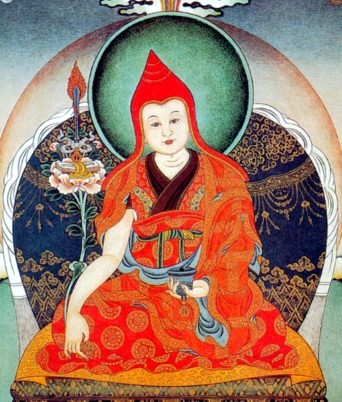Three sets of vows: Difference between revisions
Jump to navigation
Jump to search
No edit summary |
No edit summary |
||
| Line 12: | Line 12: | ||
==Major Texts== | ==Major Texts== | ||
*[[Ngari Panchen Pema Wangyal]], ''[[Ascertainment of the Three Types of Vows]]'' | |||
*[[Sakya Pandita]], ''[[Clear Differentiation of the Three Sets of Vows]]'' | *[[Sakya Pandita]], ''[[Clear Differentiation of the Three Sets of Vows]]'' | ||
Revision as of 07:16, 28 July 2008

The three sets of vows (Tib. dom sum; Wyl. sdom gsum) are:
- the vows of pratimoksha or of individual liberation (sotar gyi dompa);
- the bodhisattva vows (changchub sempé dompa);
- the samayas of the secret mantrayana (sang ngag kyi dompa).
An alternative list is:
- The vows of pratimoksha;
- the dhyana vows; and
- the vows of undefilement.
Major Texts
- Ngari Panchen Pema Wangyal, Ascertainment of the Three Types of Vows
- Sakya Pandita, Clear Differentiation of the Three Sets of Vows
Further Reading
- Geshe Sonam Rinchen, The Bodhisattva Vow, translated and edited by Ruth Sonam, Ithaca: Snow Lion, 2000
- Jamgön Kongtrul Rinpoche, The Treasury of Knowledge, Book Five: Buddhist Ethics, Ithaca: Snow Lion, 2003
- Lama Mipham's Commentary to Nagarjuna's Stanzas for a Novice Monk and Tsongkhapa's Essence of the Ocean of Vinaya, translated by Glen H. Mullin and Lobsang Rapgay, Library of Tibetan Works and Archives, 1978
- Ngari Panchen, Perfect Conduct: The Absolute Certainty of the Three Vows with commentary by Dudjom Rinpoche, Boston: Wisdom, 1996
- Sakya Pandita Kunga Gyaltsen, A Clear Differentiation of the Three Codes: Essential Distinctions among the Individual Liberation, Great Vehicle, and Tantric Systems, translated by Jared Rhoton, New York: SUNY, 2002
- Tsongkhapa, Tantric Ethics: An Explanation of the Precepts for Buddhist Vajrayana Practice, translated by Gareth Sparham, Boston: Wisdom, 2005